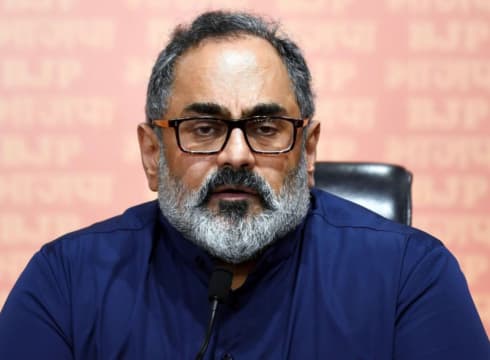Chandrasekhar said that ‘big powerful commercial platforms online’ have started to distort the internet’s fundamental characteristic of openness
We certainly don't like that the issue is not allowing small content creators to be confident that they are being fairly compensated for their content, said the MoS
Big techs have come under fire for cornering majority of ad revenues, little transparency on monetisation rules, offering limited visibility to creators about their audience data, among others
Inc42 Daily Brief
Stay Ahead With Daily News & Analysis on India’s Tech & Startup Economy
Minister of state (MoS) for electronics and information technology Rajeev Chandrasekhar said that the government is mulling a framework to curb the exploitation of content creators by big platforms.
As per news agency PTI, Chandrasekhar said that ‘big powerful commercial platforms online’ have started to distort the internet’s fundamental characteristic of openness. He added that there is a need for more debate on the matter of exploitation of creators.
“If I may dare to say so, some form of a framework (is needed) that will prevent these big platforms from exploiting the content creators, whether that’s a large news organisation or an individual content creator,” the MoS was quoted as saying.
He further said that there is a need for ‘some sort of conversation or discussion’ around maintaining the openness of the internet and symmetry between those who create the content and those who distribute it.
Noting that the government has delved into the matter very closely, the MoS said that creators ought to be compensated fairly.
“We certainly don’t like that it is not allowing small content creators to be confident that his or her content is being monetised fairly and he or she is getting fair returns for that content. There is a conversation that is ongoing…,” added Chandrasekhar.
Speaking about the upcoming Digital India Act, the minister also said that the Centre is hopeful that the new legislation will be enacted in the third term of the current government.
Chandrasekhar also spoke about the growing debate around potential job losses on account of artificial intelligence (AI)-fuelled automation. Reacting to this, the MoS said that he believes that the emerging technology will create more job opportunities via companies, enterprises, startups, among others.
“It will certainly replace some jobs. It will certainly transform some job roles. AI in its current form will certainly allow companies to do more. There is going to be disruption. There’s going to be transformation. There are going to be new job roles created, which will require new skills, new talented workforce, new talent to the workforce,” Chandrasekhar reportedly said.
Back to content creators, the biggest bone of contention between them, especially small ones, and big tech platforms is monetisation of content. While big tech platforms corner a big chunk of ad revenues, there is little to no clarity or transparency on monetisation rules.
While some type of content is paid more, others not so much. In addition, big tech platforms offer limited visibility to creators about their audience data and little control over what kind of ad campaigns they can play on their accounts.
While the opacity in rules has created a simmering tension between creators and big tech platforms, it remains to be seen what kind of policies the Centre comes up with. In any case, this will likely open a new front between the government and tech platforms, which have previously sparred on issues such as deepfakes, fake news, misinformation and child sexual abuse content.
{{#name}}{{name}}{{/name}}{{^name}}-{{/name}}
{{#description}}{{description}}...{{/description}}{{^description}}-{{/description}}
Note: We at Inc42 take our ethics very seriously. More information about it can be found here.


